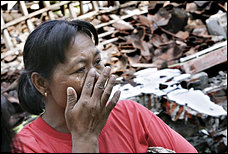Many Indonesians have psychological trauma after quake
Many people, having suffered from Indonesian quake, not only lost their houses and property, but also had a turn. Six-year-old Sofiana Nurhidayah fights off images of the massive earthquake that turned her modest house into a pile of bricks and rubble, crushing to death her mother and father as she played outside.

"I'm very afraid to remember," the girl says, her raven hair tied back with black ribbons, smiling as she draws a picture of her new tent home with Indonesia's mountains in the background.
Adults are struggling too. Mental health institutions in Yogyakarta, the largest city in the quake zone, have been inundated with patients since the May 27 quake that claimed more than 5,700 lives, said the Health Ministry's Dr. Rustam Pakaya.
At least two have committed suicide, another health official said earlier, and several others have attempted to take their lives.
At the children's center in Canden village, one of five set up by the government and UNICEF to offer counseling, 80 children show up every day to play games, draw and receive support, said health worker Kahono Agos Suhartoto.
"We want to return the traumatized children back to their normal lives," he said, adding that especially older boys and girls were suffering psychological trauma, with some teens experiencing severe hysteria and uncontrollable bouts of fear, reports the AP.
N.U.
Subscribe to Pravda.Ru Telegram channel, Facebook, RSS!





